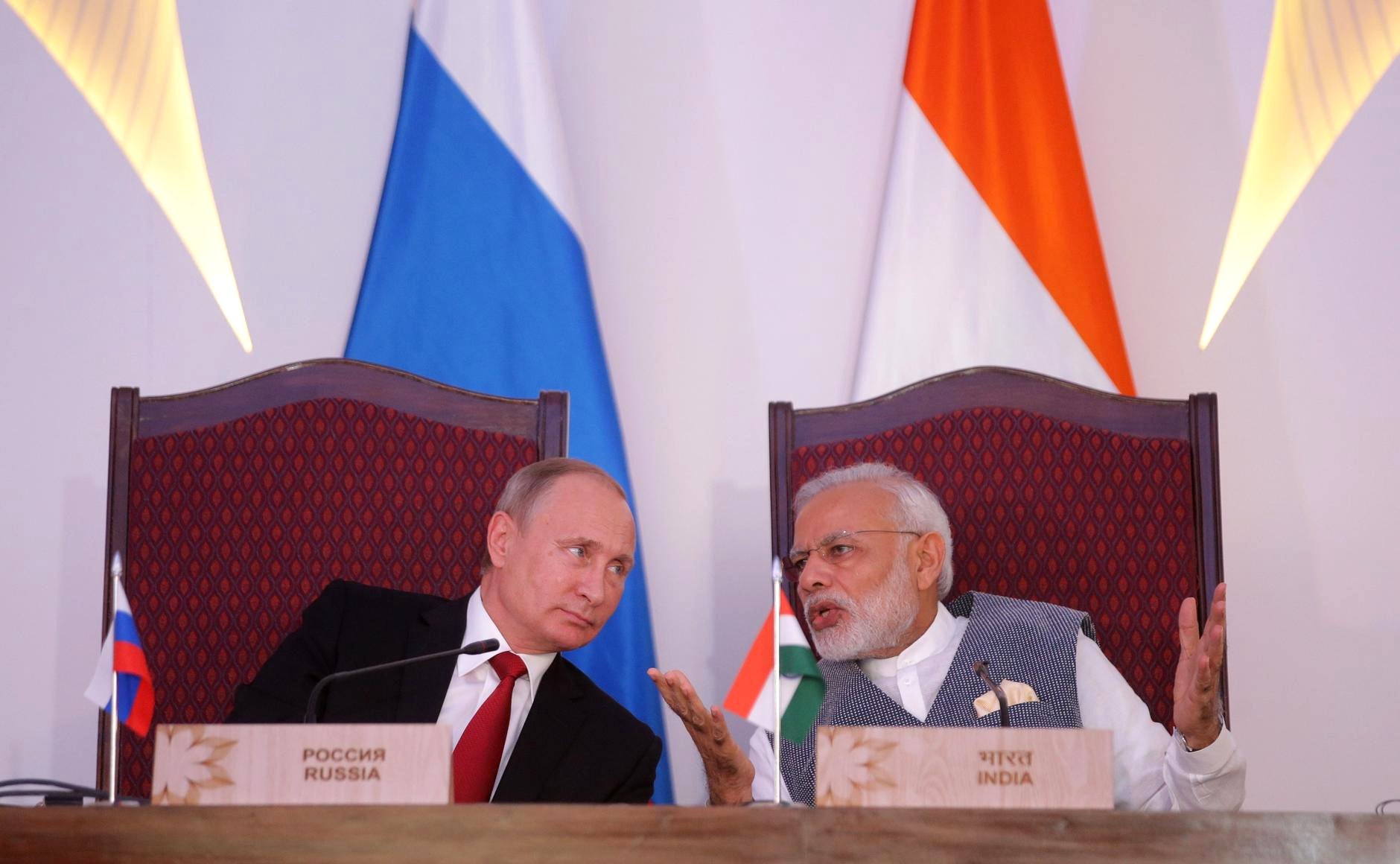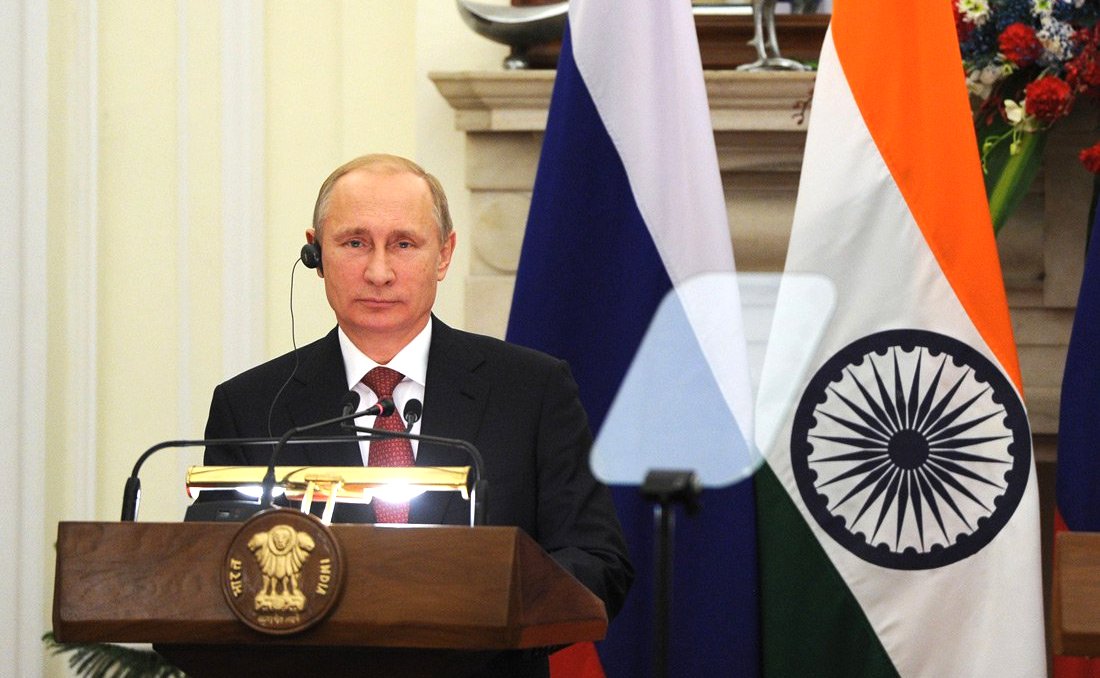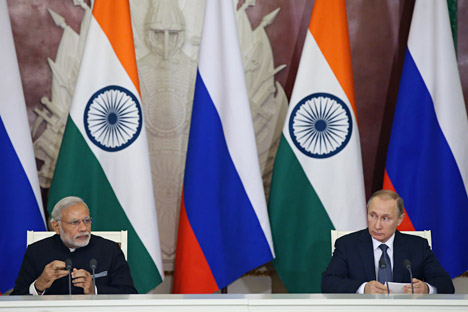Putin, Modi strengthen strategic partnership at Goa summit

Russia continues to remain a trustworthy strategic partner for India.
Kremlin.ruThe outcome of the 17th annual India-Russia summit between President Vladimir Putin and Prime Minister Narendra Modi in Goa on October 15 again demonstrated that Russia continues to remain a trustworthy strategic partner for India, in changing global geo-political situations. Following delegation level talks, led by Putin and Modi, 16 major agreements were signed, worth billions of dollars, in sectors including defence, energy, trade and investment, space and smart cities.
Lauding the meeting Modi said, “The highly productive outcomes of our meeting clearly establish the special and privileged nature of our strategic partnership.” In a statement at a joint press briefing with Putin after the talks he described India’s special partnership with Russia using a Russian proverb: “An old friend is better than two new friends.”
The 16 agreements signed after the talks include three prominent deals on bilateral defence cooperation: Inter-Governmental Agreements (IGAs) for five S-400 ‘Triumf’ air defence missile systems, four Admiral Grigorovich-class (Project 11356) guided missile stealth frigates and a share-holders agreement for a joint venture (JV) to manufacture 200 ‘Kamov’-226 helicopters in India.
Observers consider these long-awaited defence deals as significant because they materialized after India recently signed the Logistics Exchange Memorandum of Agreement (LEMOA) with the US. The LEMOA provides conditional US access to military bases in India, giving a perception that it was drifting away from Russia.
It is expected that by 2020, Russia will start delivery of S-400s to India. It is considered one of the most advanced long range missile systems in the world and can tackle all incoming airborne targets at ranges of up to 400 km.
The Hindustan Aeronautics Limited (HAL) and Russia’s Rostec State Corporation will set up a joint venture to manufacture 200 Kamov-226 helicopters, at the location of HAL’s choice. Of the four improved Krivak or Talwar class stealth frigates, two will be built in Russia and the other two in India with Russian assistance.
These defence deals are estimated to cost India a total of around $10 billion. While the cost of S-400s will be about $5 billion, the deals relating to the Kamov-226 helicopters and the stealth frigates will be worth $1 billion and $3 billion, respectively.
“The agreements on manufacturing of Kamov- 226 helicopters, constructions of frigates, and acquisition and building of other defence platforms are in synergy with India’s technology and security priority. They also help us achieve the objectives of ‘Make in India’ programme,” Modi said.
During the talks, both countries also agreed to organize an annual military industrial conference later in 2016. It is expected to allow stake-holders on both sides to institute and push collaboration.
The joint statement issued after the talks stated that the India-Russia military industrial conference will address military-related issues, including spares, repair, and maintenance of Russian supplied equipment and co-production.
After signing the agreements, Putin and Modi jointly inaugurated an e-plaque, commemorating the foundation work of the Kudankulam nuclear power plant. They also dedicated the Unit-2 of the plant and witnessed the foundation laying of its Units 3 and 4.
The joint statement said they noted with satisfaction the “progress in discussion on the General Framework Agreement and the Credit Protocol for Kudankulam Units 5 and 6, with a view to conclude these documents before the end of 2016.”
Modi described the continuing implementation of cooperation in nuclear energy sector at Kudankulam as examples of tangible results of India-Russia cooperation in the field. “With proposed construction of another eight reactors, our wide-ranging cooperation in nuclear energy is set to bring rich dividends for both of us,” he said.
Modi also said that India would be expanding its presence in Russia’s hydrocarbon fields. He said over the last four months, in a “clear expression of our strong and deep engagement” in the hydrocarbon sector, Indian companies invested around $5.5 billion dollars in Russian gas and oil sector.
They also signed an important agreement for the joint study of a gas pipeline to India from Russia. In a separate agreement, a Russian consortium comprising energy giant Rosneft Oil Company, commodities trader Trafigura and private investment group United Capital Partners agreed to purchase 98 percent of Essar Oil for $10.9 billion. Rosneft also signed an agreement with ONGC Videsh for education and training in oil and gas sector.
The agreements signed include an MoU for expansion of bilateral trade and economic cooperation, affirming that liberalization of travel regime for businessmen was an important step towards strengthening bilateral trade. They also called on Indian and Russian companies to finalize new and ambitious investment proposals in different fields, including pharmaceuticals, chemicals, mining, aircraft construction and diamond trade.
Russia has also agreed to invest $500 million into the Indian infrastructure, along with an equal investment by the newly formed National Infrastructure Investment Fund (NIIF), to form a $1 billion “Russian-Indian Investment Fund.”An MoU was signed to set up the bilateral investment fund by NIIF of India with Russian Direct Investment Fund (RDIF), to facilitate high-technology investment in both the countries.
India and Russia also signed an agreement on cooperation on International Information Security, to counter terrorism and drug-trafficking.
“Russia’s clear stand on the need to combat terrorism mirrors our own. We deeply appreciate Russia’s understanding and support of our actions to fight cross-border terrorism that threatens our entire region. We both affirmed the need for zero tolerance in dealing with terrorists and their supporters,” Modi said.
All rights reserved by Rossiyskaya Gazeta.
Subscribe
to our newsletter!
Get the week's best stories straight to your inbox

